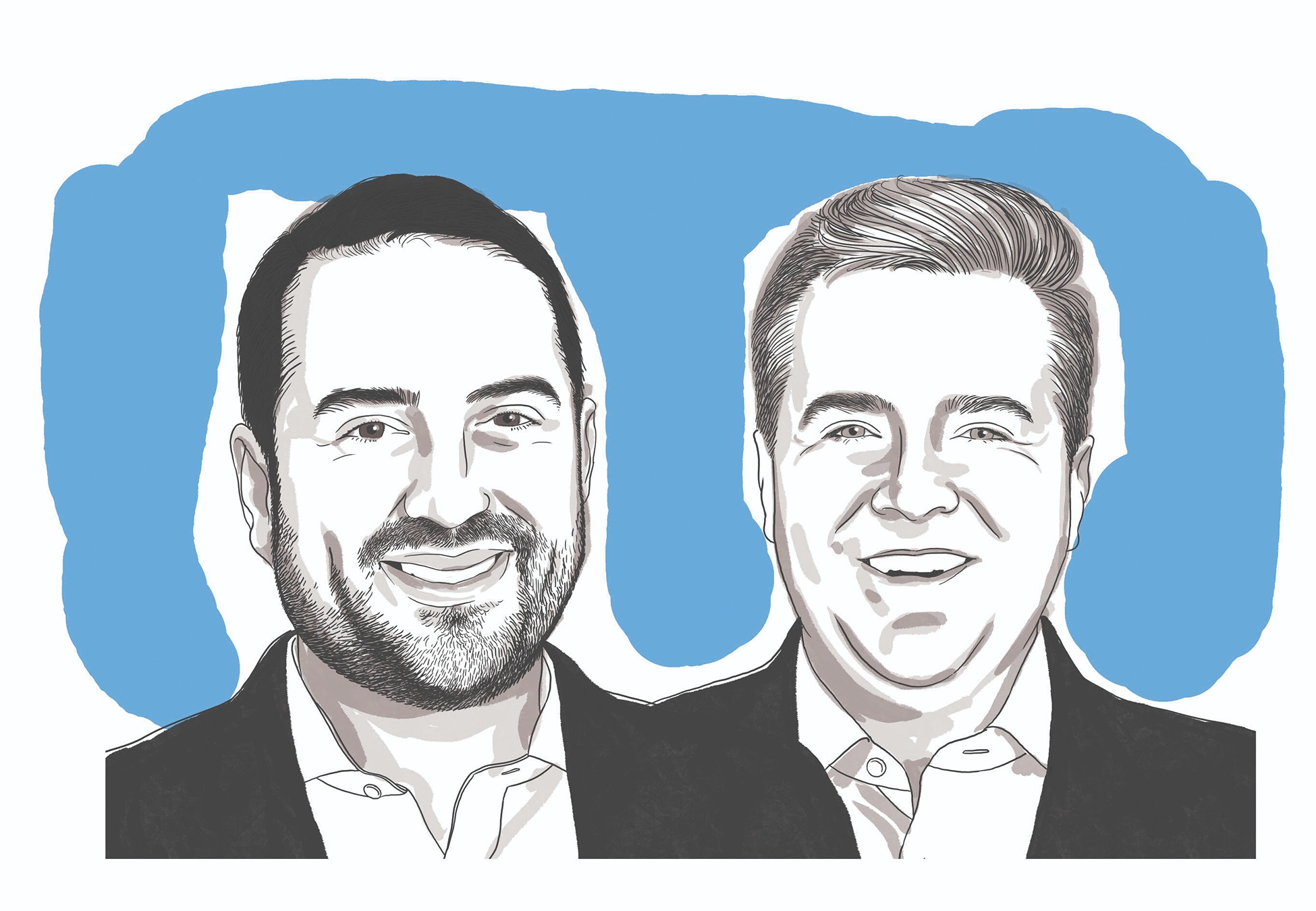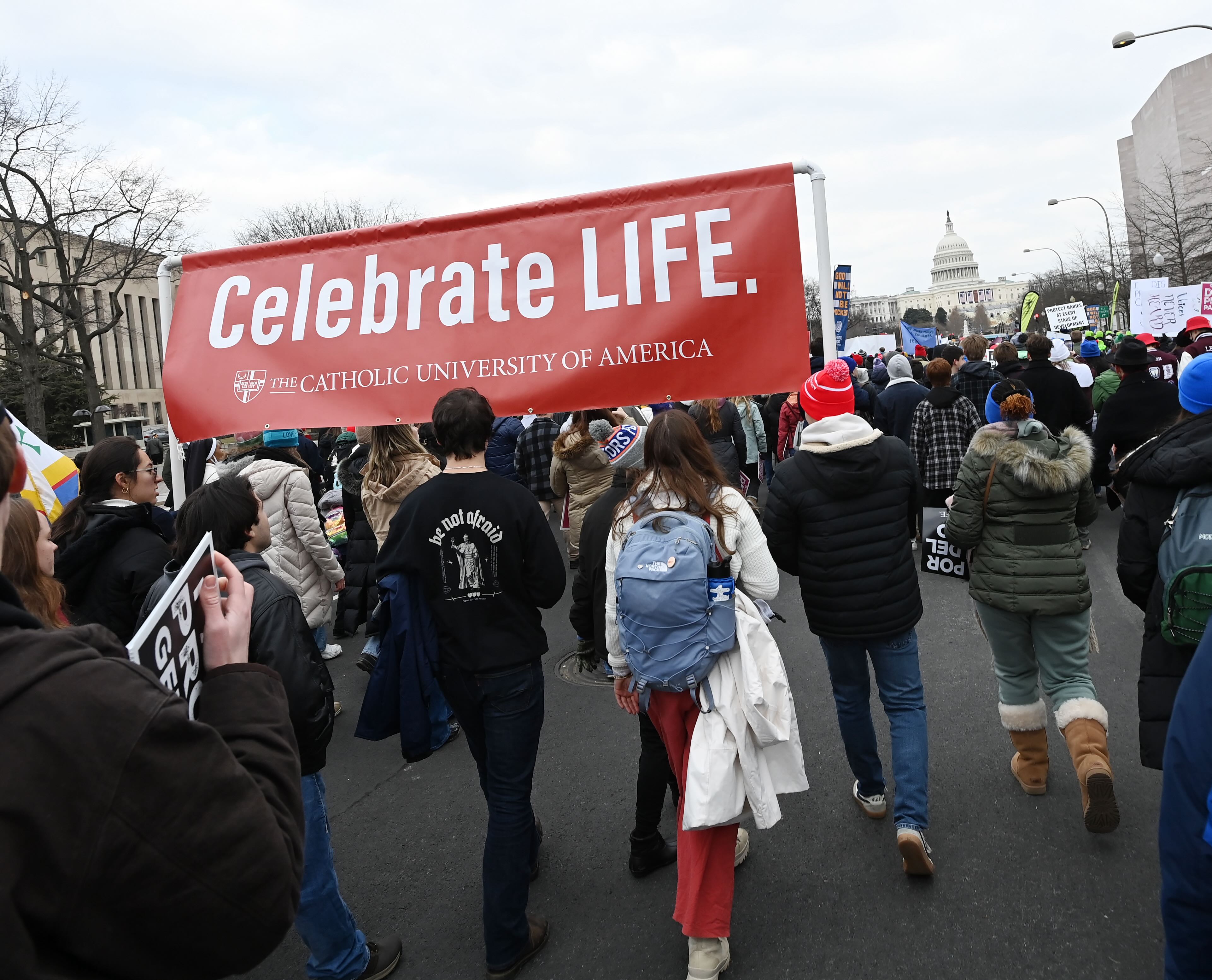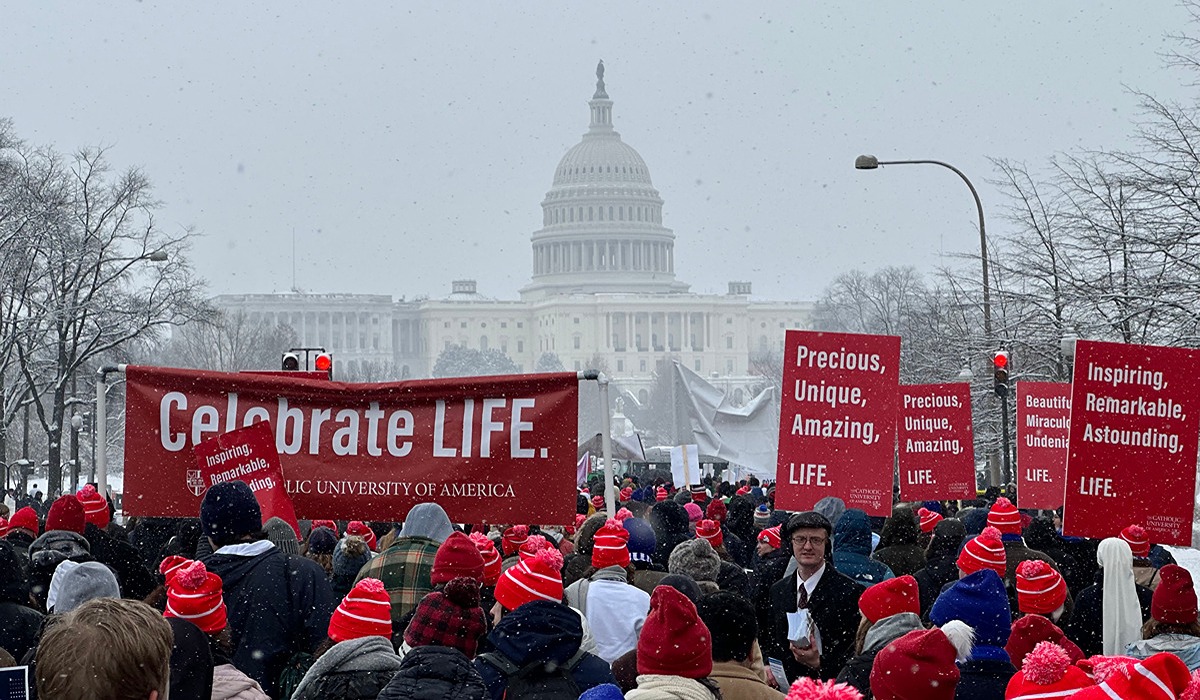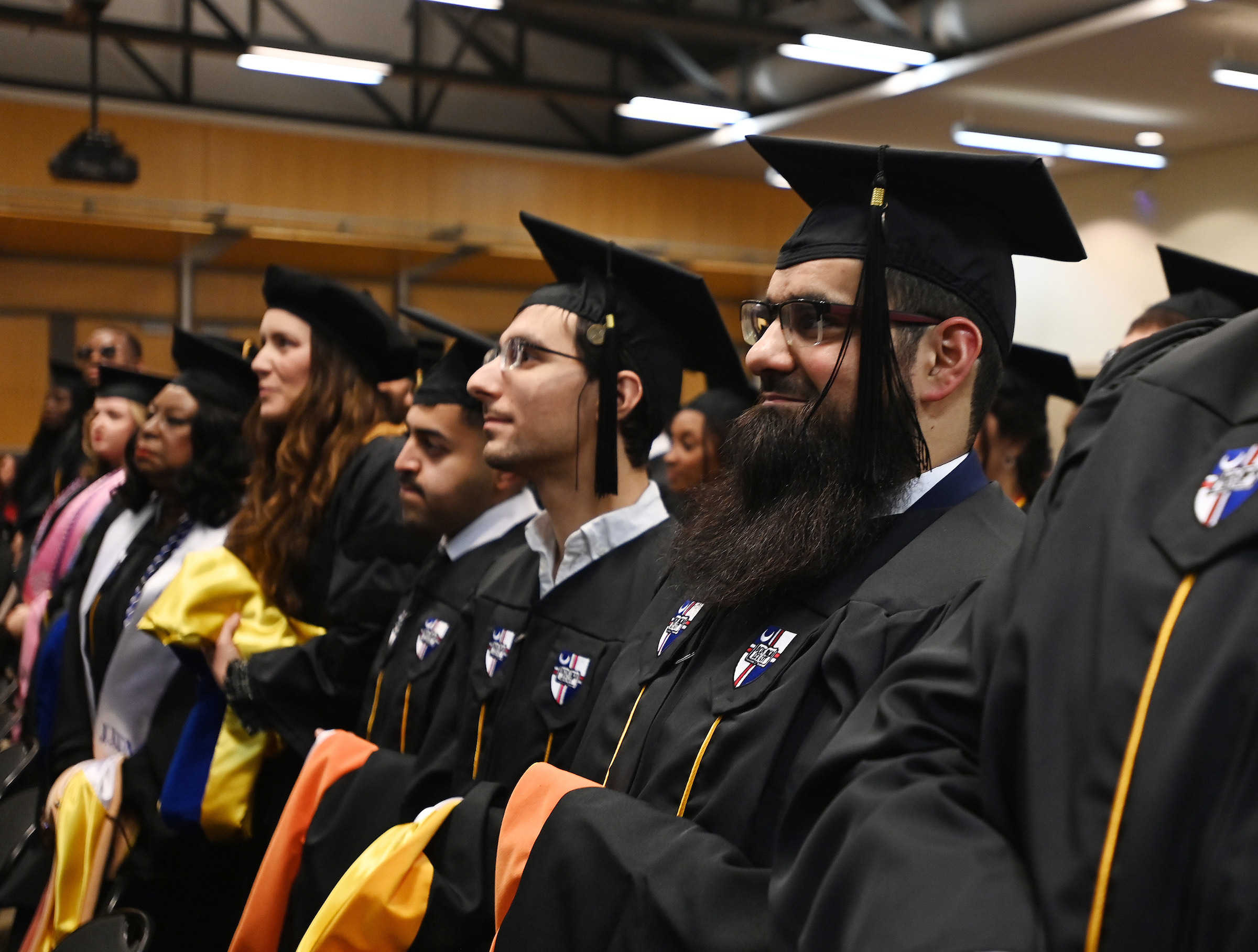Our editors touched base with two alumni, Peter Rescigno and John McCarthy (both B.A. Politics, 2013), to get their take on the current political milieu and how their friendship that began at Catholic University has grown over the years — despite their ideological differences. Rescigno is now the executive director of the New York Electrical Contractors Association and the New York City Chapter of the National Electrical Contractors Association, and McCarthy is President Joseph Biden’s senior advisor for political engagement.
This conversation has been edited for length and clarity.

John McCarthy: So we first met in Dr. White’s “Introduction to Politics” class our freshman year. There was a row of us who sat in the back — we were all politics majors. Pete and I stayed close through that whole first year, lived together after that, and were part of the College Democrats (CDs) and College Republicans (CRs) throughout our time at university.
Peter Rescigno: Yeah, I remember our classroom in Caldwell Hall. This was during the Obama administration and the mood on campus was interesting, especially as we were involved in active leadership of the CRs and CDs. Overall, studying politics at Catholic University helped me understand people — what motivates them and why people make decisions. Funny enough, I still read Dr. White’s op-eds that he shares with me on Instagram — even though he has retired!
McCarthy: Yes, so during that time when President Obama was president, we were learning about party realignment and things like that certainly prepared me from a technical perspective to think and analyze things. Today, I think that the CUA politics department has a very good, practically applied way of teaching politics. Where you actually learn how to both process data and analyze the intentions of voters and understand how people use power.
On campus, the mood from 2010–2013 felt like an earlier time in politics. I think that our CRs and CDs at the time, we generally wanted to be collaborative and help each other across the board. By our senior year, President Obama had just gotten reelected. So I would say that for most of us involved with the College Democrats and Republicans, we were actively engaged on different campaigns, and it was still always cordial.
Rescigno: I always thought it was cordial, too. I vividly remember the RNC launching their “Fire Pelosi” campaign, as she was Speaker of the House at the time.
McCarthy: The bipartisan friendship that Peter and I have became somewhat of a novelty that was discovered when Osama bin Laden was captured. We went down to the White House that day, and by chance, one of the people who talked to us was Audie Cornish from NPR, and so we were on their “Drivetime” radio show the next day. And then the Washington Post, Chronicle of Higher Education, and others reached out because they thought that was interesting. And then we ended up doing “Fox and Friends ” in New York a couple weeks after that.
I think that that’s one of the things that’s missing today from politics — at that time on college campuses, especially in DC, people could disagree on means but generally agreed on common values. Nowadays, it feels like the larger work that needs to be done is getting people back into that kind of common dialogue so they are able to agree that we’re all part of this common enterprise of a country versus being on separate teams looking for totally separate things. I think that that has been a very drastic shift in public life since we were at Catholic University.
On Civil Dialogue and Friendship
Rescigno: The loud voices on opposite ends of the political spectrum tend to be the loudest, right? But all the work tends to be done at the center. So just because you’re the loudest, you know, doesn’t mean you’re actually accomplishing things.
McCarthy: I would say it also probably helps that we come from the more moderate and centrist wings of our parties. So, to your point, Peter, I think extremists have kind of taken over both lengths in some ways, but, you know, that kind of certainly made things easier. And I do think that that was something that Catholic University cultivated — it was a place that fostered dialogue.
Rescigno: Political beliefs have never predicated any sort of relationship I’ve had with anybody. Otherwise I wouldn’t be friends with John, and John would not have been the best man at my wedding, and John would not have been at my son’s first birthday party this weekend, right? But thinking about the political environment in America right now, honestly, I think it’s sad. I’m not really sure how else to say it. It’s just sad, you know, people have become so disagreeable.
I think if everybody took a step back and listened a little bit more to find out where we each stand, we would have real discourse. - Rescigno
McCarthy: I think that temperatures are certainly high, and to some extent, rightfully so. I think that some of the issues that we’re discussing come down to fundamental rights, and people have strong feelings and fears on that, and I think that that is all legitimate. However, I think that kind of across the board, one of the things that the discussion is missing is kind of back to what I was saying earlier about the need to have a common project. I think the reason that tensions are so high on both sides, the left and the right, is because at the end of the day, people are feeling like they’re not being heard.
I would also add that people are not as polarized as our politics suggest. I travel around with President Biden all the time, and when we’re out in the States, I see this is true as we visit people in their individual communities, in their towns, at their kitchen table, inside of their families. I think that we’ve become terrible listeners as a country, and we need to find ways to sit and say: “Okay, I can hear what you’re saying and get what your endpoint is,” and not instantly jump to the place of “you being a bad person.”…Because again, though, in many ways, we are more connected than perhaps ever before, people feel less and less connected to each other. So it is obviously a big problem, but the next generation of leaders emerging in public life will tackle this question. And it won’t be in the fancy marble buildings of Washington but in city councils and houses of worship and job sites all across America, that’s where people will figure out how to do this.
Rescigno: I also think that people need to do a better job of listening. People are always quick to say what they think, what they believe should be going on, or what direction things should be heading. But I think that if everybody took a step back and listened a little bit more to find out where we each stand, we would have real discourse, you know? I think that politicians should listen first because their job at the end of the day is to represent people.
On Their Experience in Politics
McCarthy: Also on a related note — Peter and I have both been part of this world, we both worked on Capitol Hill at the same time, in internships and after college. I feel like the Hill taught me more about how to be a professional than probably any place, just because to accomplish anything you have to do it with other people.
Rescigno: Having studied at Catholic, we had the luxury of being in DC and internships were easy to come by on the Hill. So I did some intern work on the Senate side, and then on the House side and then I worked for a congressman from Southern California for four years after I graduated.
McCarthy: I worked for a non-profit my first year out of college but then went to work on the Hill for a congressman from my hometown, Frank Malone. Peter’s coworkers became some of my best friends at that time. We “cross-pollinated,” I would go with them to Republican-leaning receptions and they’d come with me to a Democrat event. Your friends just became each other’s friends, which is how this whole public service life is supposed to work. And there are some people I met through Peter back then that I still talk to and work with today.
Rescigno: And I am still connecting with these contacts years later. I was at an event in New Jersey a few weeks ago and I saw someone I met through John.
On Favorite Presidents
Rescigno: And in terms of people in the public sphere who do civil discourse well, I think back to my college days. I really admired John Boehner and George W. Bush. They were amazing examples of people and elected officials who were willing to kind of put the country before their own personal ambition. And I think that that’s something that is desperately missing from public life today. I also have respect for Joe Biden — I have his memoir on my desk as we have this conversation…It’s there for you, John!
McCarthy: I love it, Peter! So now working in Biden’s administration, I can tell you that I think that Joe Biden will be remembered as an incredible president. Our biggest triumph was the ability to pass the bipartisan infrastructure law. This legislation process re-energized the Republican and Democratic House and Senate members who worked on it and strengthened that connective tissue.
Rescigno: For me, my favorite president would be George W. Bush, for a couple reasons. I think that he deployed both a conservative approach and compassionate approach to his politics. As a human being, he was practical in his approach to dealing with Americans where they are. He was president when I was growing up and first started to like and follow politics. He had a real impact on my life. Turned out he was Republican, so there you have it!
McCarthy: For my favorite presidents, I would have to go with Kennedy and Johnson. Kennedy had a lofty vision for America and believed in a common enterprise like the moon landing. And LBJ, I liked his tactical skills in delivering to the people. Biden has been compared to LBJ for his record of accomplishment in the legislature.
I do think that was something Catholic University cultivated, as a place that fostered dialogue. - McCarthy
On Favorite Memories of College
Rescigno: I really have fond memories of our time on campus, doing campaign trips and having access to so much by just being in DC. In the fall of each year, College Democrats and Republicans would go knocking on doors and volunteer on campaigns, which built such camaraderie.
McCarthy: I agree! Being in DC for Obama’s inauguration, and then the Pope’s visit to Catholic University in 2015 was amazing. Also the speaker events on campus were a huge highlight — the University, just by virtue of where it is, offered these unbelievable opportunities.
Rescigno: I credit a lot of what I learned at Catholic and the people I met to where I am today.
McCarthy: What we have talked about here in this conversation was the need for a return to civility and a kind of convening. And I think that Catholic University best represents what that should look like in Washington. Convening a safe place where people are able to come together with common values and then discuss critical topics in a free and open way.
Rescigno: I think that sums it up perfectly — I have nothing further to add. (Part of the reason why we’re still friends is that I always give John the last word!)


